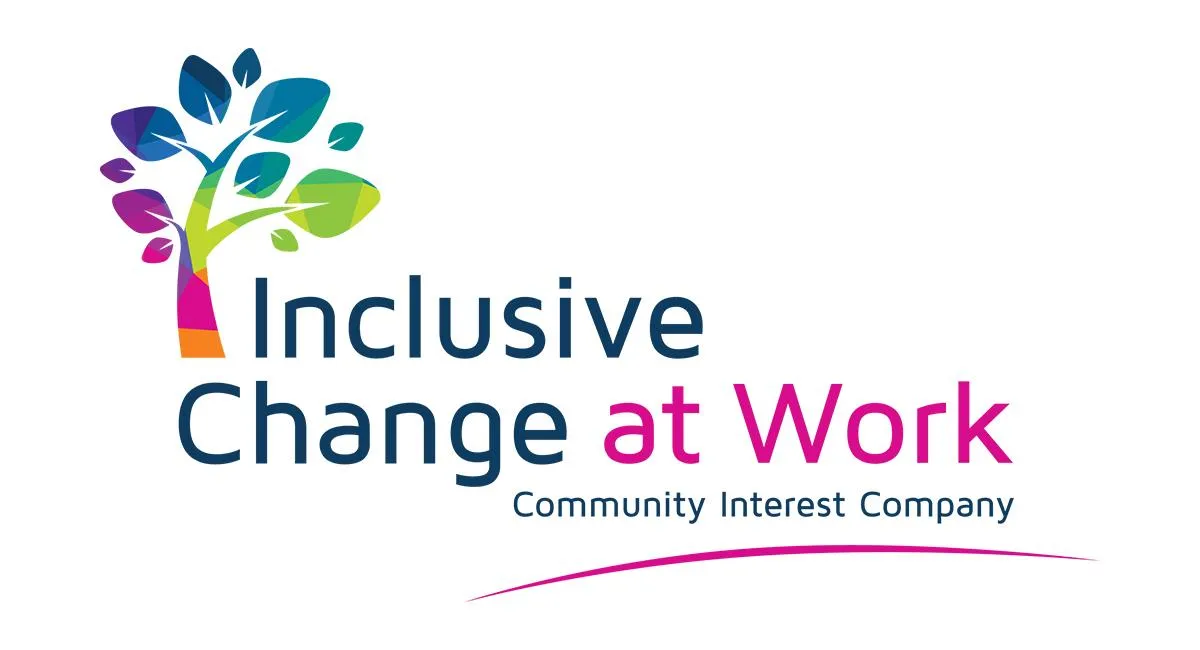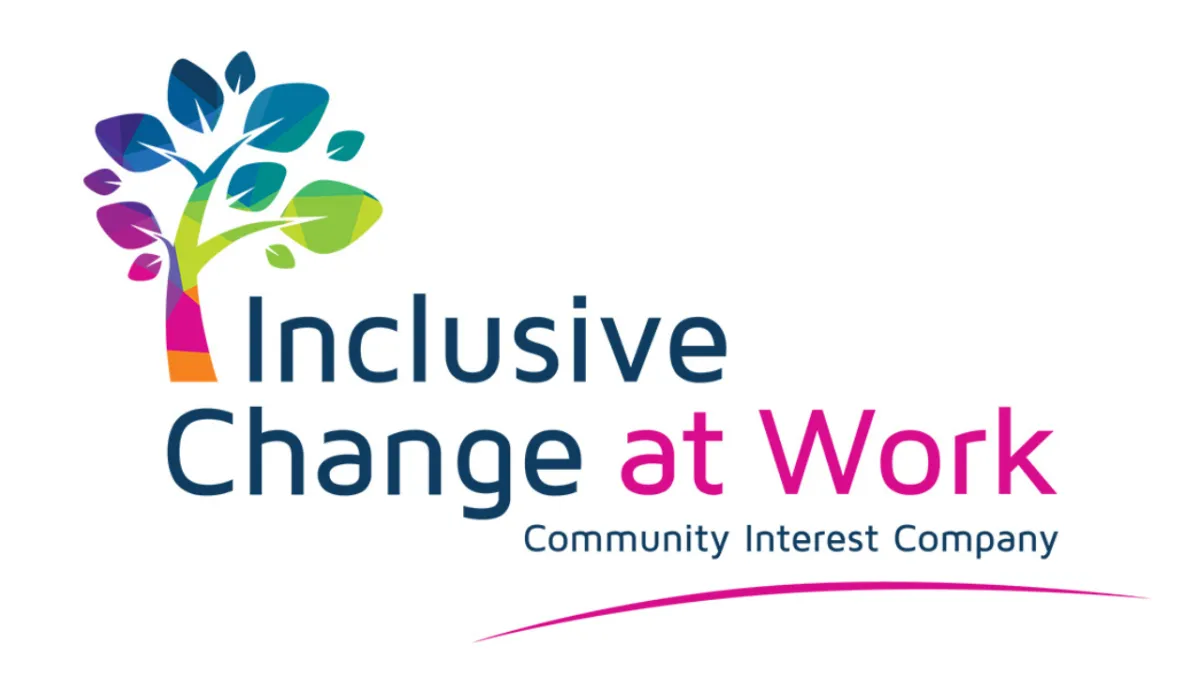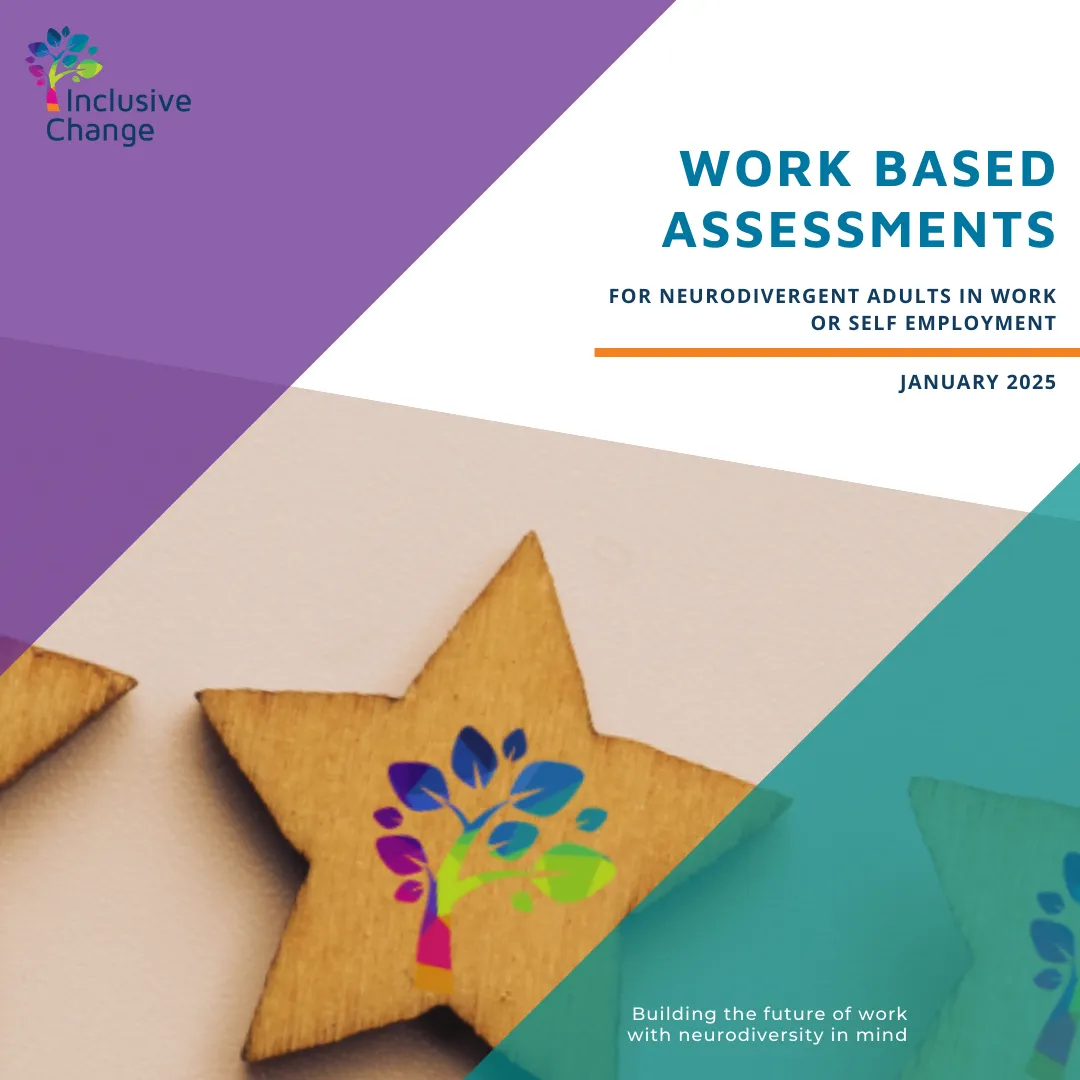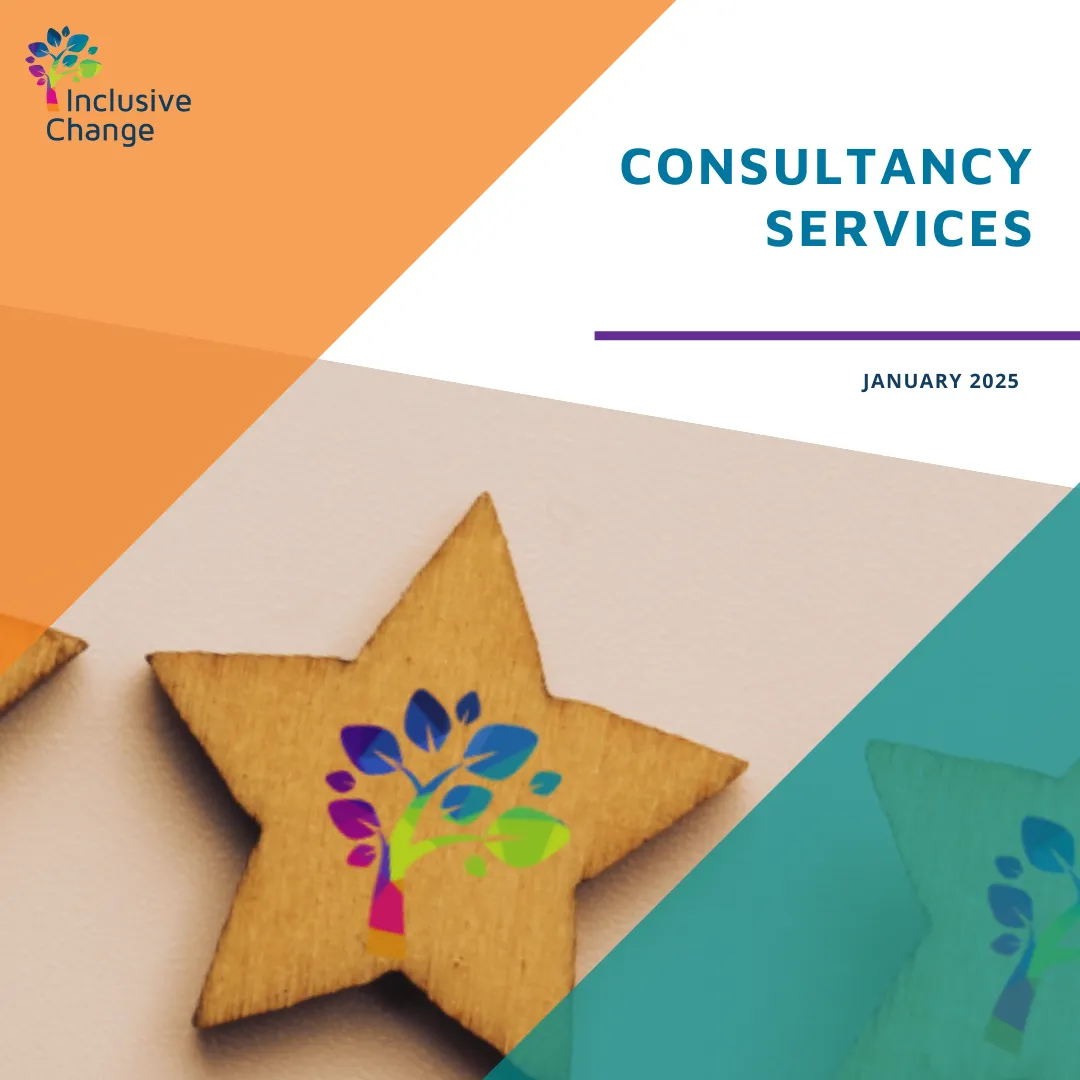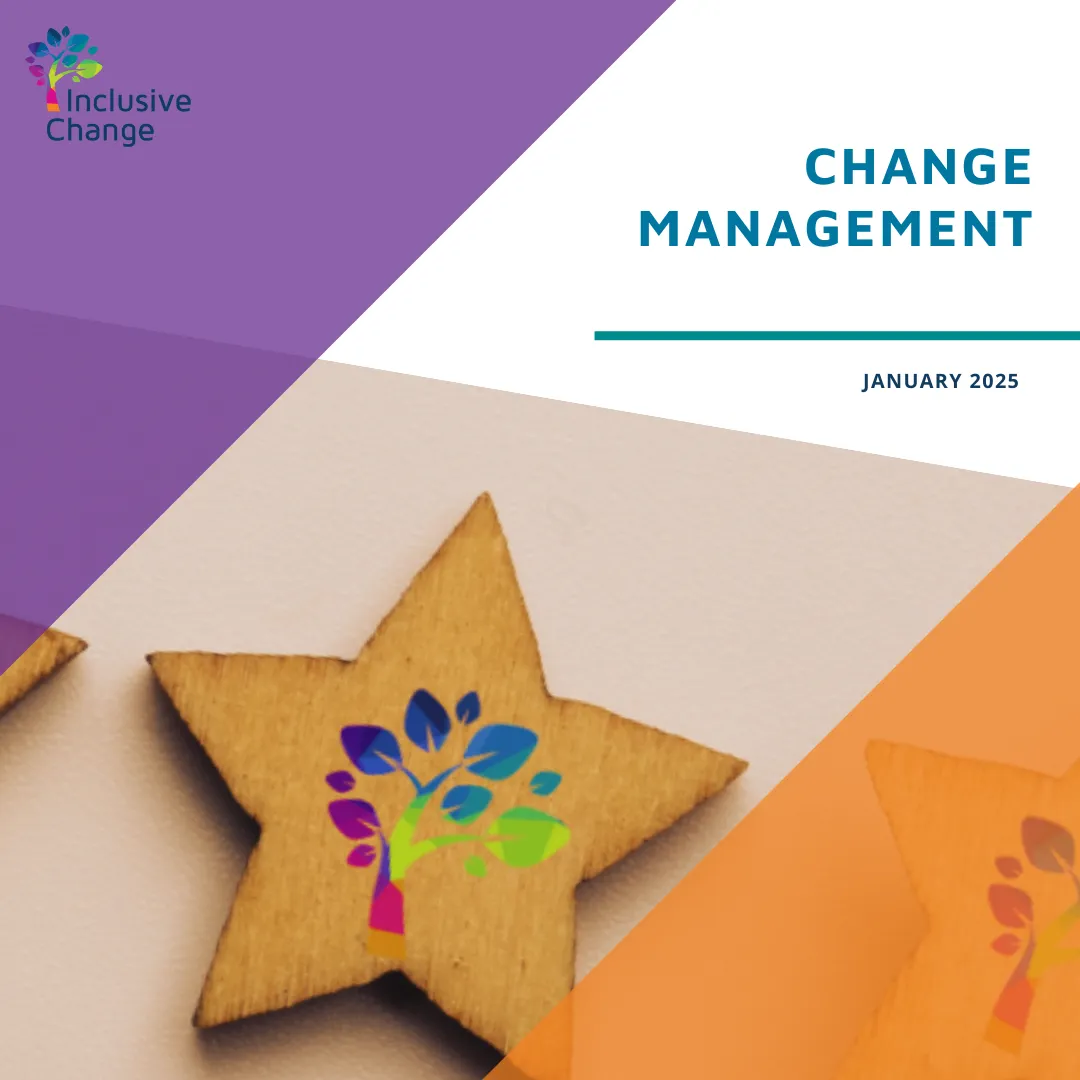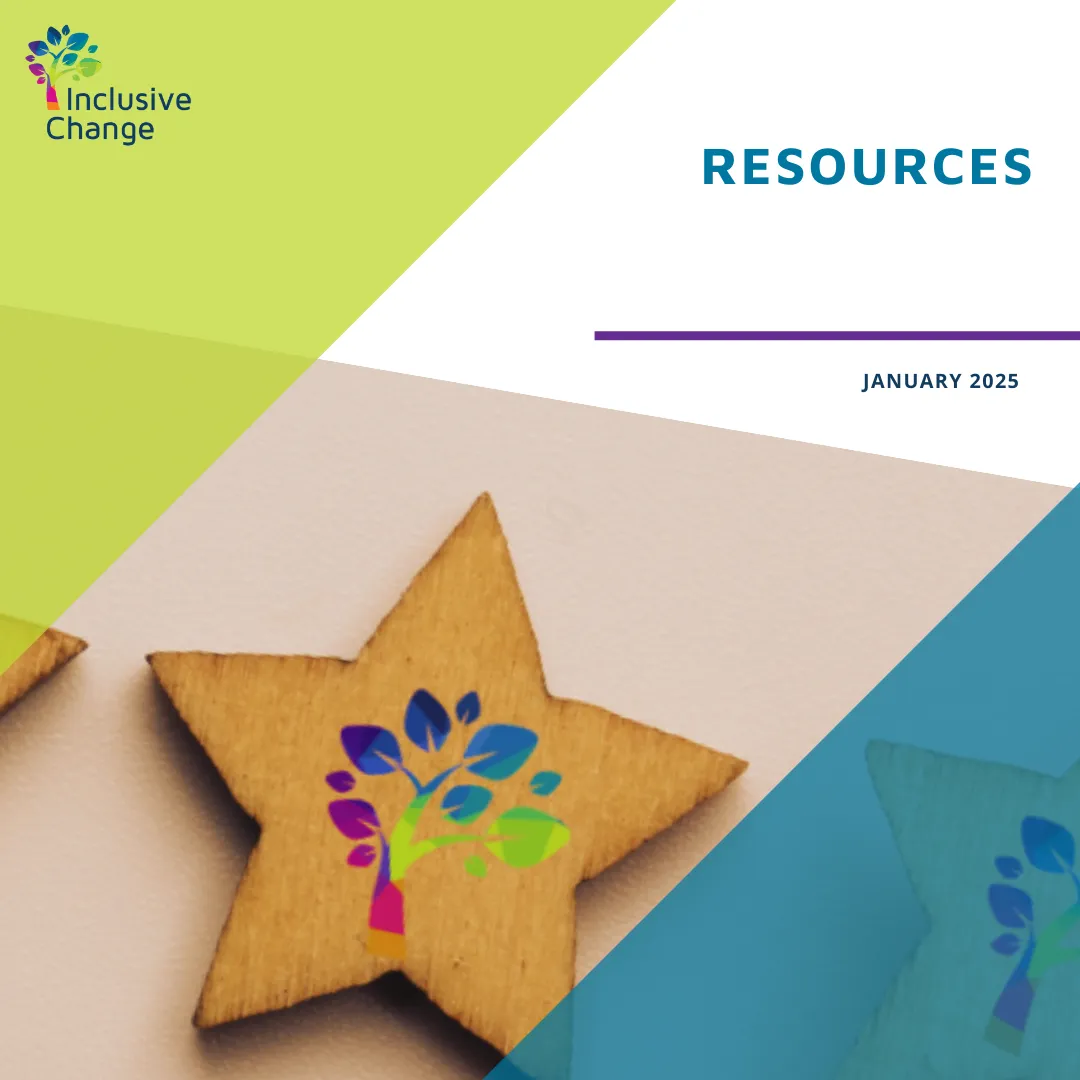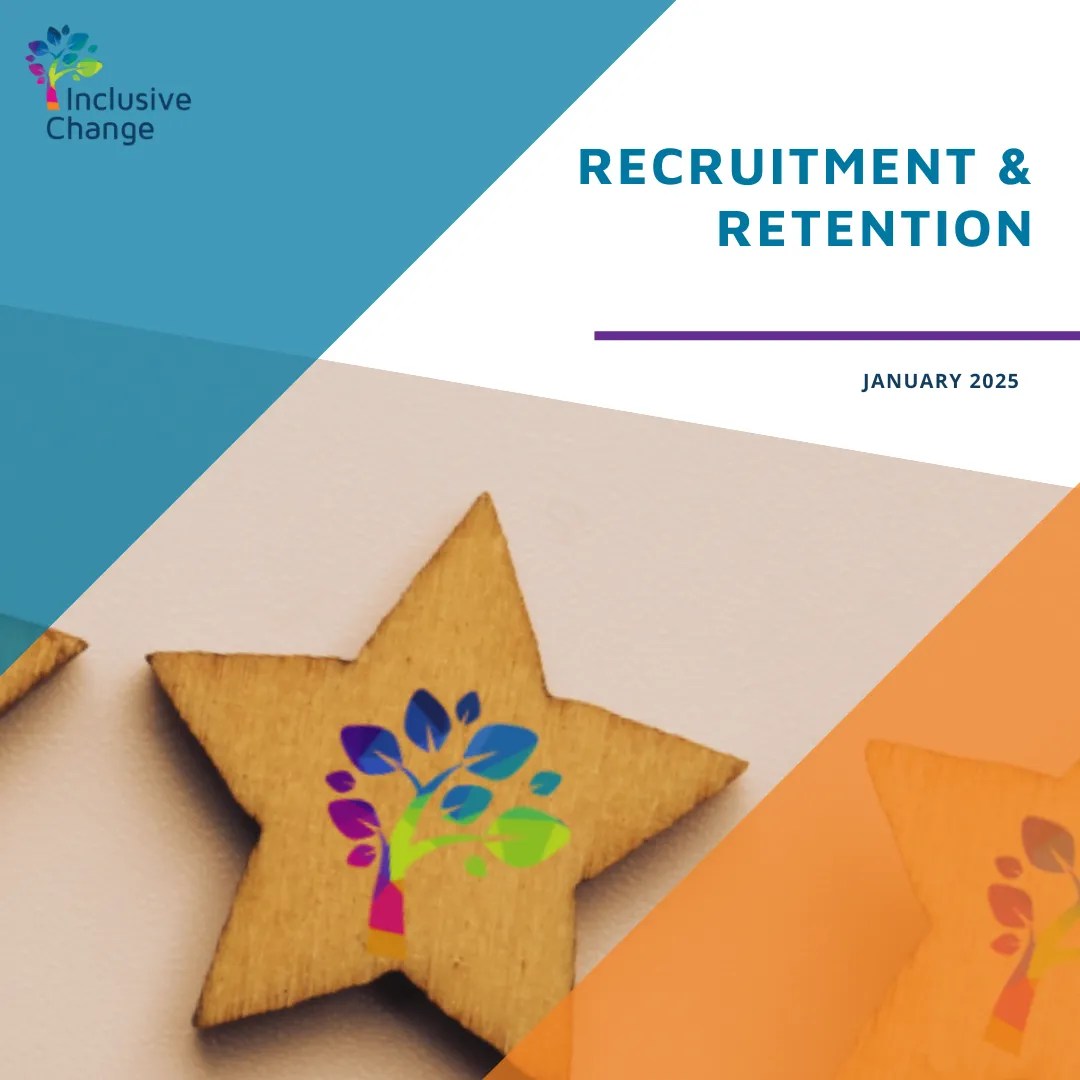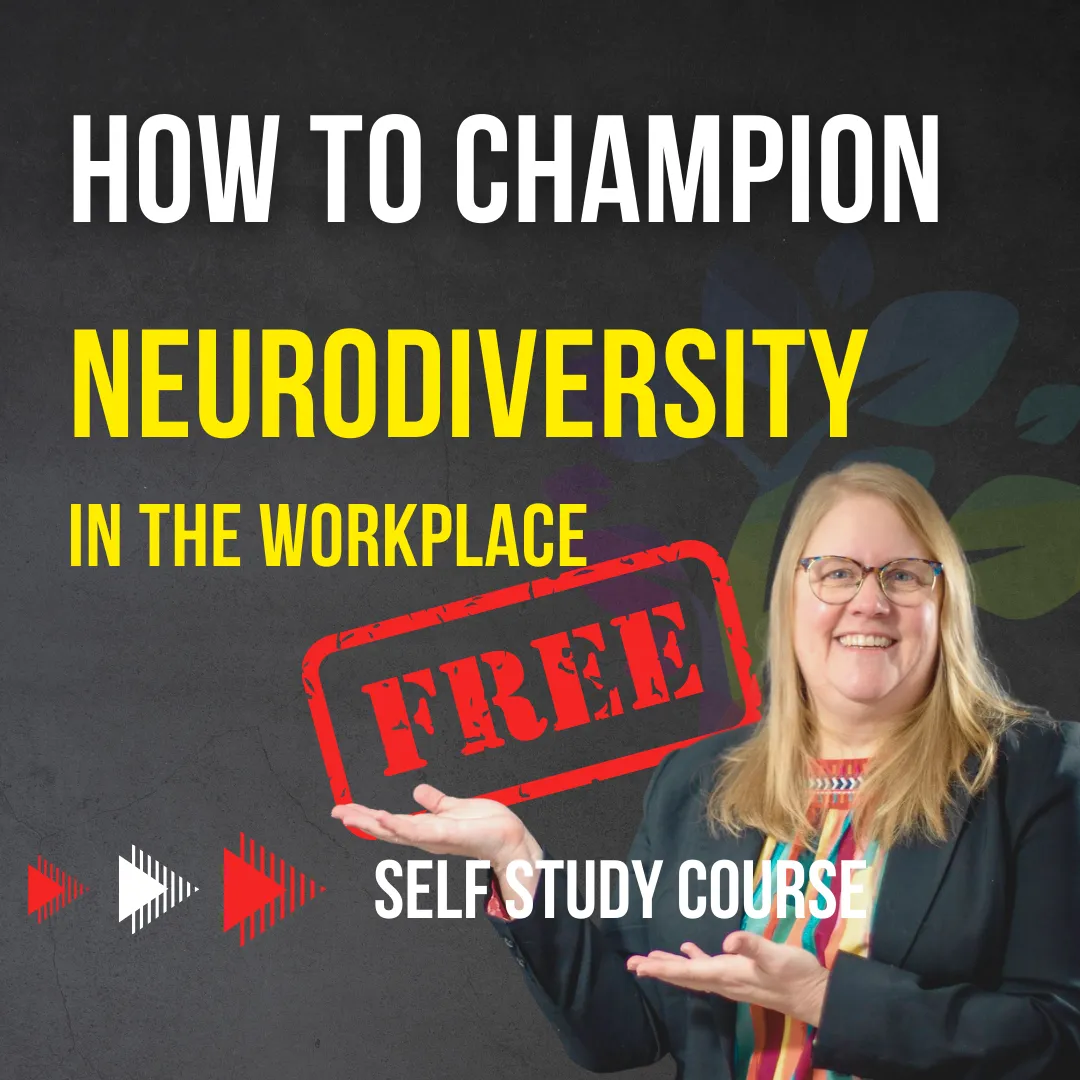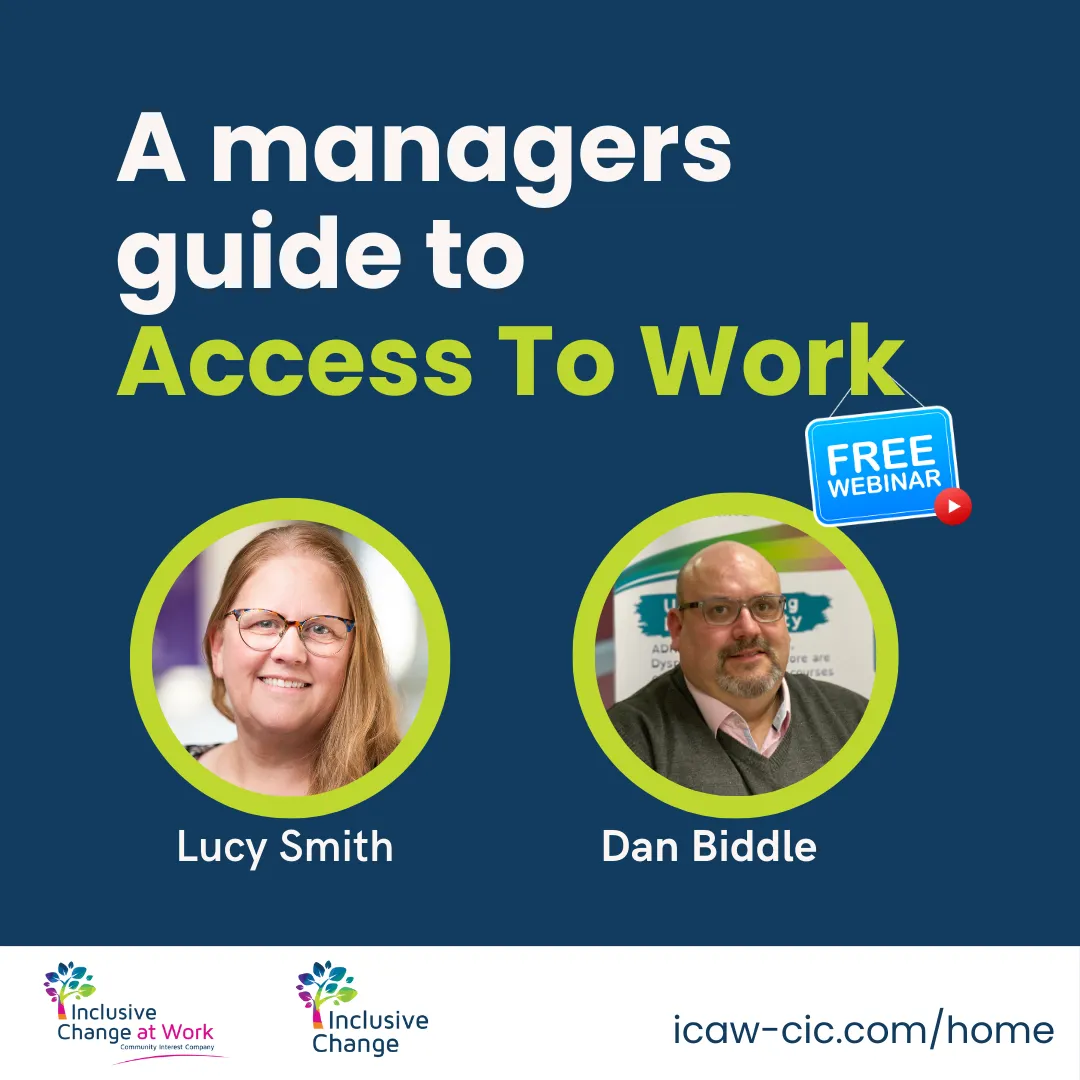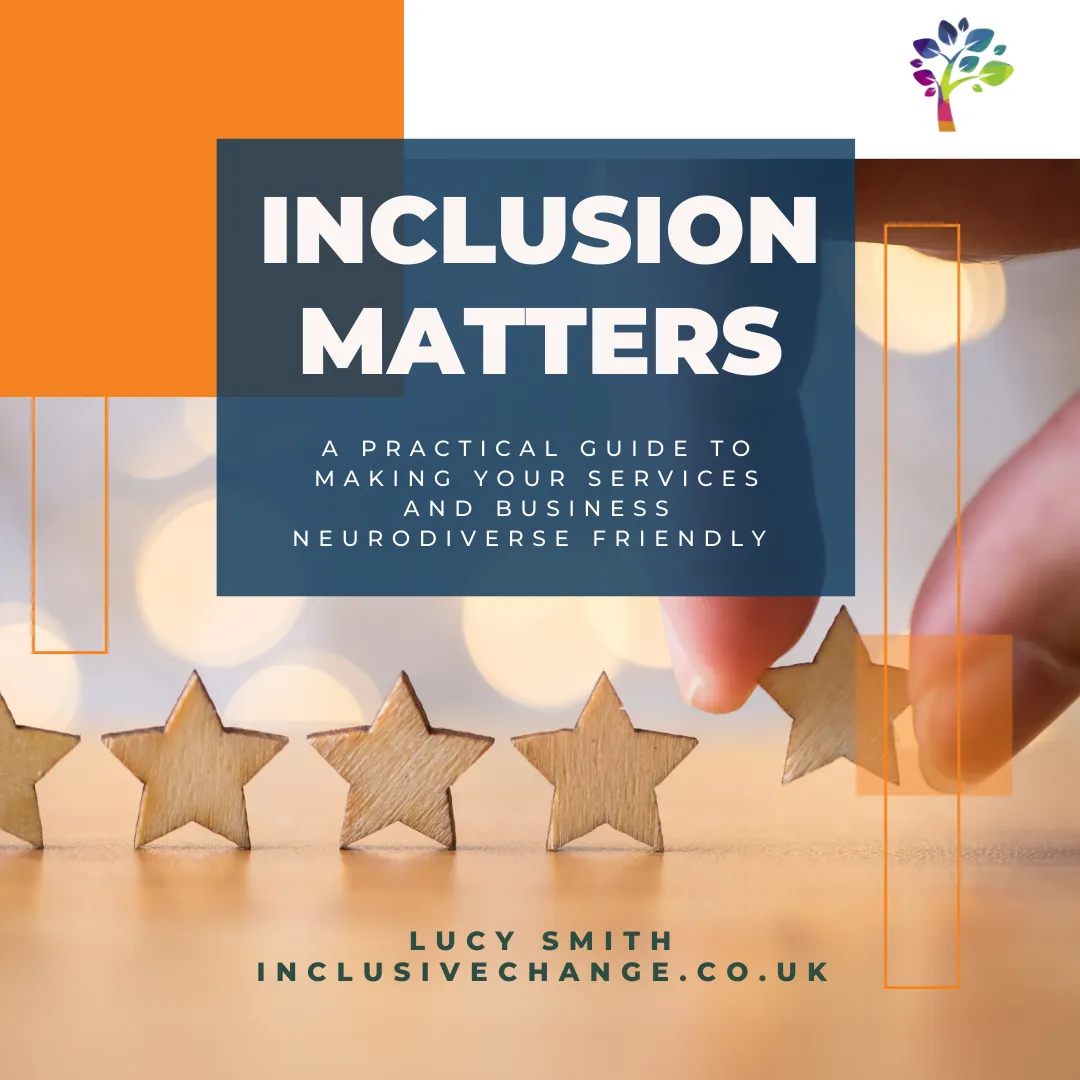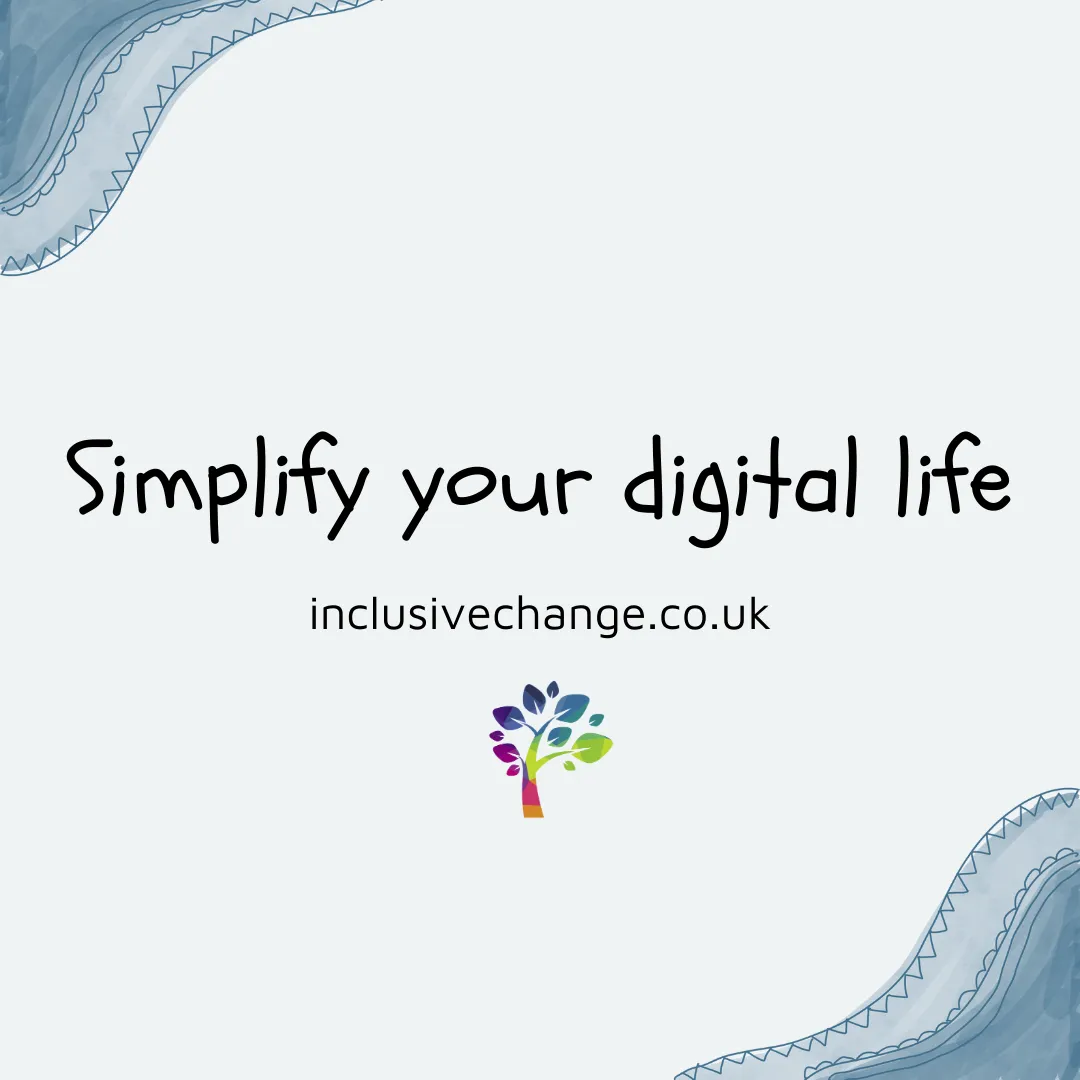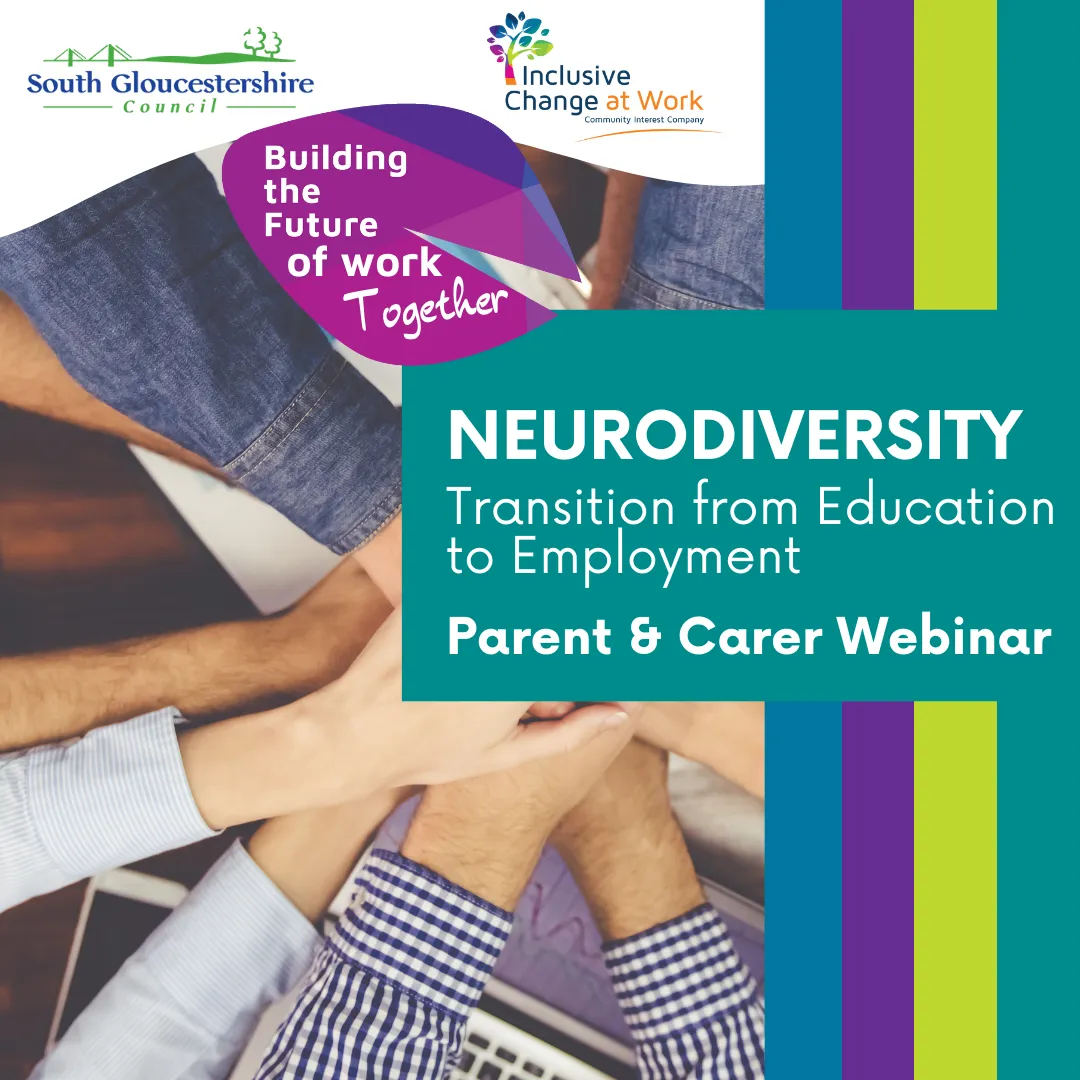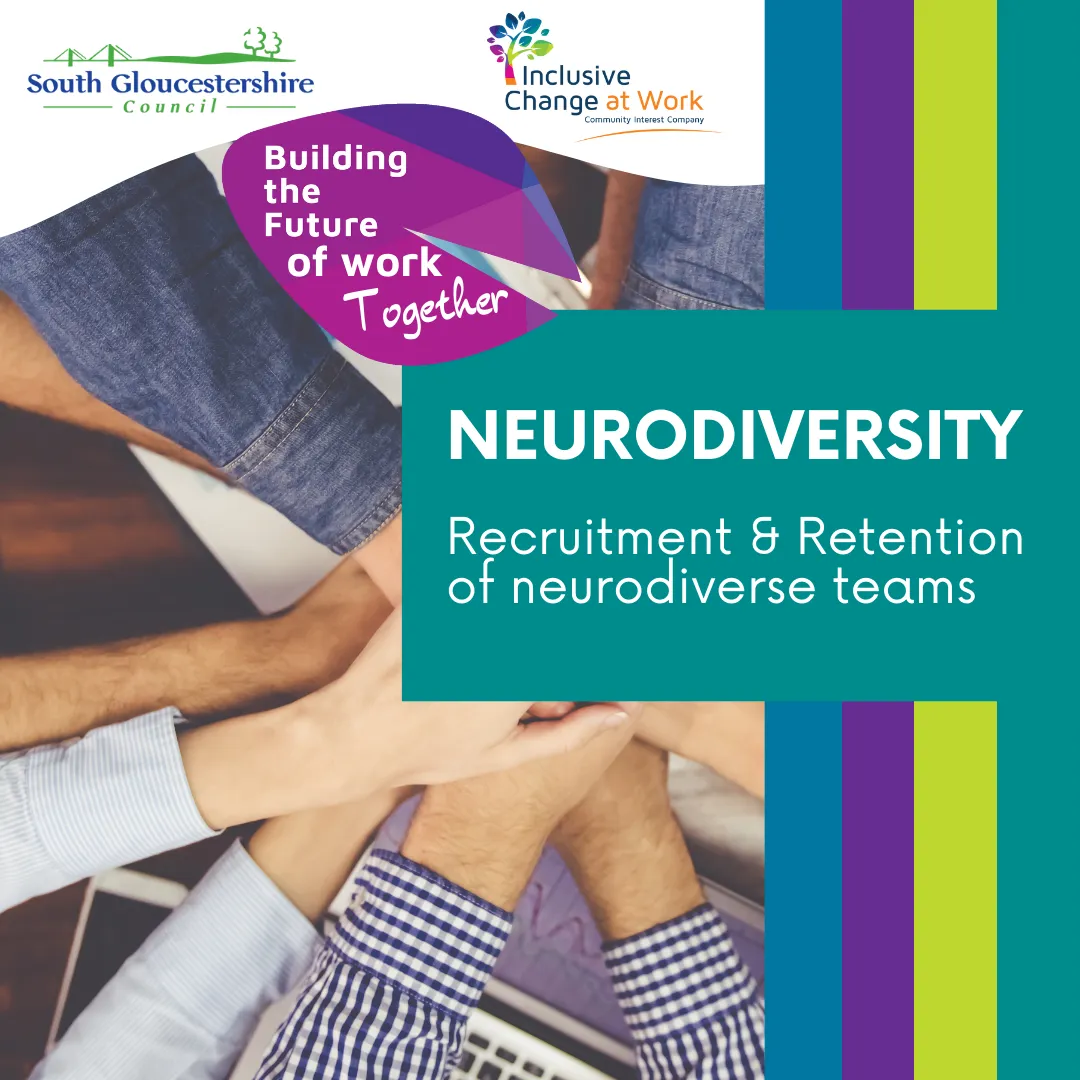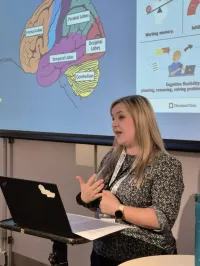Inclusive Change at Work
In the community
We want to thank you for attending our workshops in Emersons Green Village Hall, made possible with funding from Emersons Green Town Council. It has been wonderful to meet so many people and spark meaningful conversations about Inclusion.
We offer a variety of ways to collaborate and support your journey. Be sure to join our mailing list to stay informed about our latest projects, exclusive offers, and exciting initiatives.
To help you take your next steps, we’ve curated this page with valuable resources, insights, and new projects, designed to inspire and empower your conversations about neurodiversity. Dive in, explore, and Keep the Conversation Going!
A Recap of the Slides & Discussions
Let's Talk About Neurodiversity: Building an Inclusive Community Together
Date: 16th January 2025
Speaker: Lucy Smith
Key Takeaways From The Evening
Neurodiversity is Common but Overlooked – 1 in 7 people in the UK are neurodivergent, yet many face barriers in employment and inclusion.
Workplace Challenges Persist – Long assessment wait times, lack of disclosure (76%), and limited employer focus (49%) highlight the need for change.
Inclusive Workplaces Matter – Reasonable adjustments and open discussions help create supportive environments.
Younger Generations are Driving Change – 53% of Gen Z identify as neurodivergent, making inclusion more important than ever.
Action is Key – Safe spaces, advocacy, and meaningful support systems help neurodiverse communities thrive
Supporting Neurodivergent Families
Date: 30th January 2025
Speakers: Lucy Smith & SGPC
Key Takeaways From The Evening
Inclusive Spaces Foster Support – Creating environments where neurodivergent individuals feel safe and valued is essential for meaningful inclusion.
Resilience is Key – Building resilience through learning, coping strategies, and supportive frameworks helps neurodivergent families navigate challenges.
Workplace and Education Accessibility Matters – Reasonable adjustments in schools and workplaces ensure neurodivergent individuals can succeed without unnecessary barriers.
Open Dialogue Encourages Understanding – Safe spaces for discussion help break stigma, allowing neurodivergent individuals and allies to share experiences and seek support.
Ongoing Support and Resources Make a Difference – Access to helpful resources, events, and advocacy networks empowers neurodivergent communities to thrive.
Building the Future of Work With Neurodiversity in Mind
Date: 6th February 2025
Speakers: Lucy Smith & Andy Jackson
Key Takeaways From The Evening
Neuroinclusion is a Business Advantage – Embracing neurodiversity leads to increased innovation, productivity, and employee retention. Yet, many workplaces unintentionally create barriers for neurodivergent employees.
The Social Model of Disability Matters – Disability is not about the individual but the barriers in their environment. Simple workplace adjustments, like sensory-friendly spaces and flexible communication styles, can unlock neurodivergent talent.
Inclusion is Needed at Every Career Stage – From recruitment to promotion, neurodivergent employees face unique challenges. Clear job descriptions, structured onboarding, and strengths-based performance reviews help ensure fairness.
Recruitment & Progression Need Reform – Traditional hiring methods often exclude neurodivergent talent. Companies should prioritize skills-based hiring, alternative application methods, and clear promotion pathways.
Actionable Steps Make a Difference – Businesses should start by reviewing hiring practices, improving workplace accessibility, investing in mentorship, implementing inclusive policies, and increasing diverse representation
Menopause and Neurodiversity
Date: 20th February 2025
Speakers: Kirsty Brown, Fitness for Life, & Lucy Smith
Key Takeaways From The Evening
Menopause Can Intensify Neurodivergent Traits – Changes in hormones can amplify difficulties with memory, focus, sensory sensitivity, emotional regulation, and fatigue, making daily life more challenging.
Dopamine & Cognitive Support Are Crucial – Activities like exercise, music, creative outlets, and structured routines help maintain dopamine levels, while a diet rich in protein, omega-3s, and key micronutrients supports brain function.
Self-Regulation Strategies Help Manage Symptoms – Sensory tools, mindfulness techniques, and cognitive-behavioral strategies can help counteract brain fog, mood swings, and attention difficulties.
Hormonal & Cognitive Support Can Be Beneficial – Hormone Replacement Therapy (HRT) may help some individuals, while structured routines, planners, and reminders aid in managing cognitive challenges.
Community & Environmental Adjustments Matter – Reducing sensory overload, seeking peer support, and creating neuroinclusive workplace environments can improve well-being and productivity for neurodivergent individuals going through menopauseHere's some stuff
Digital Wellbeing for Young People
Date: 6th March 2025
Speakers: Lucy Smith & Emily Chittell
Key Takeaways From The Evening
The Impact of Digital Overuse – Excessive screen time, especially on social media, can negatively affect mental health, as seen in Owen’s experience of using their smartphone to escape emotions but ultimately worsening their mood.
Balancing Digital Consumption – It's important to be mindful of how digital tools influence our emotions and well-being, avoiding over-reliance on social media for coping.
Creating Digital Boundaries – Simplifying digital life can improve mental health, making space for healthier habits and real-world connections.
Support and Adjustments – Neurodivergent individuals may benefit from reasonable adjustments and access-to-work accommodations to create a more balanced digital experience.
Reasonable Adjustments and Access to Work for Neurodiverse Minds
Date: 20th March 2025
Speakers: Lucy Smith & Support Team
Key Takeaways From The Evening
Legal Obligation for Employers: Under the Equality Act 2010, employers must make reasonable adjustments to ensure that disabled employees are not at a substantial disadvantage in the workplace.
Defining Reasonable Adjustments: Adjustments can include changes to the workplace, working arrangements, task execution, or providing necessary support and equipment.
Disclosure and Employer Responsibility: Employees need to disclose their disabilities for employers to act on their duty to make adjustments. Employers are not obligated to assume or act on ambiguous signs of a disability.
Balancing Adjustments with Job Requirements: Adjustments should create fairness without lowering the essential standards of a role. Selection criteria should be inclusive but still maintain job integrity.
The Business and Cultural Benefits: Implementing reasonable adjustments fosters an inclusive workplace, reduces staff turnover, and leads to broader innovations that benefit all employees

Recommended Groups and Services
Articles & Reports
30% More Productive: The ROI of a neurodiverse workforce - 2023
New data suggests that 15% to 20%
of the population may be neurodivergent – up from estimates of 5% to 10% just five years ago. This shift underscores the critical need for employers to broaden the horizons of their diversity, equity and inclusion (DEI) efforts to encompass neuro-inclusion
Half of neurodivergent employees miss work due to lack of support - March 2024
Half of neurodivergent employees have taken time off work due to their neurodivergence, a 5% rise from last year, according to City & Guilds’ Neurodiversity Index. The report also found that 36% received no workplace support, and 18% didn’t know where to seek help.
New Survey by The Harris Poll Reveals Workplace Stigma for Neurodivergent Employees - May 2024
Understood.org, a leading nonprofit empowering more than 70 million neurodivergent people who have learning and thinking differences, such as ADHD and dyslexia, today announced the results of a Harris Poll of over 2,000 U.S. adults ages 18+. The poll shines a light on the challenges and opportunities facing people with learning and thinking differences, such as ADHD, dyslexia, or dyscalculia, in the workplace.

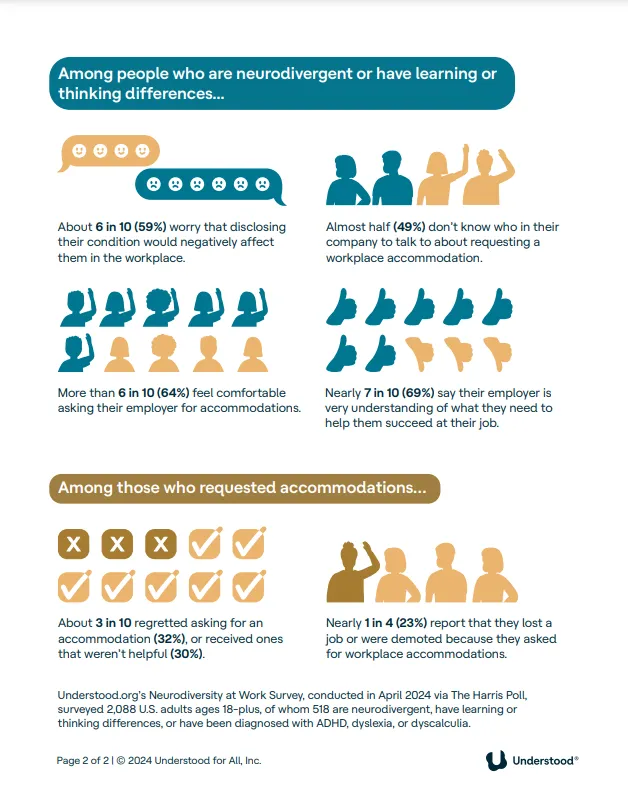
CIPD Neuroinclusion at work report 2024
The reality of neurodiversity means that every interaction at work takes place between people with different brains – yet, typically, very few organisations are thinking about neurodiversity or neuroinclusion. This represents a significant missed opportunity for organisations looking to address their key talent priorities at the same time as addressing inequalities at work faced by neurodivergent people
Meet Your Hosts and Expert
Speakers

Lucy Smith
Lucy is the founder of Inclusive Change and Inclusive Change at Work CIC. She has lived experience of neurodiversity and has been working in the area of neurodiversity for 6 years. Lucy combines a career in change management in internationally renowned organisations with experience in education to create thoughtful and inspiring training and consultancy services.

Daniel Biddle
Daniel is a highly experienced accessibility consultant with extensive experience of disability. Daniel has particular expertise in acquired disability, including acquired neurodiversity. He established the National Disability Employment & Advisory Service in 2022 and focuses on supporting neurodivergent young people & adults into employment.

Kirsty Brown
Kirsty is a proactive, self-motivated individual with managerial experience in motivating teams and providing exemplary service. As a personal trainer and women's health coach, I use an empathetic approach to set and monitor achievable goals, adapting strategies to support clients through life's challenges. My expertise in menopause coaching includes workshops that empower women to confidently make lifestyle changes and navigate difficult times.

Vicky Henderson
Vicky is a multi-award-winning coach, mentor, speaker and trainer. She specialises in working with young people (11-24yrs) helping them grow in confidence, feel happy and generate hope and excitement for a better future.
In addition to working with young people, Vicky also works with parents, schools and employers, to ensure that all young people are afforded the support and help they need to thrive.

Andy Jackson
Andy is a Non-Executive Director of Inclusive Change at Work CIC, as well as an entrepreneurial and leadership coach and a dedicated advocate for neurodivergent individuals.
As a parent to a young adult navigating life with undiagnosed neurodivergence, Andy brings both professional expertise and personal insight to their work.
A skilled coach, facilitator, and trainer, Andy is passionate about enhancing organisational performance and supporting teams to thrive.

South Glos Parent Carers
South Glos Parent Carers (SGPC), the local parent carer forum that represents & supports parent carers of children and young people with Special Education Needs and Disabilities (SEND) in South Gloucestershire. Driven by a desire to make a difference for every SEND family in South Gloucestershire, SGPC attend meetings across the education, health and social care sectors to ensure service providers understand the challenges families face, so that positive changes can be made. SGPC also offer support to parent carers, via online and drop-in support sessions as well as workshops on a range of SEND topics. The SGPC team are all parent carers themselves, so they truly understand the SEND journey & challenges. From their personal experiences & those of their community, they have gained valuable insight, information and a wealth of SEND knowledge.

Discover Project Sandbox: Shaping a Safer Digital Future
Inclusive Change at Work CIC proudly presents
Project Sandbox, a ground-breaking initiative designed to champion digital safety and disability inclusion.
In collaboration with the Avon & Somerset Police & Crime Commissioner, we’re creating an engaging series of podcast and radio episodes that dive deep into building safer digital spaces for disabled and neurodivergent individuals.
We invite you to be part of this important conversation and join us in driving meaningful change.
Stay tuned, get involved, and let’s make the digital world a place for everyone.

Important Dates in Our Calendar
June 2025
2nd - Understanding & Empowering ND in Sport - Glos. F.A
9th-10th - Festival of Sustainable Business - Bristol Beacon
12th - F'Up Exeter - The Bootlegger, Exeter
July 2025
22nd - F'Up Bristol - The Square Club, Clifton
Free Resources - Guides, Webinars & Courses
Check Out Our Latest Blog Posts

ADHD & Time Management: Pomodoro Technique
ADHD & Time Management Blog - Pomodoro Technique
Have you considered organising your workday into 16 ‘tomato’ intervals? The Pomodoro Technique might suit you if:
You often find yourself side-tracked by other responsibilities during work
You tend to overload your daily schedule
You routinely handle tasks with unpredictable time requirements
You frequently work beyond your peak productivity hours
This time management strategy is simple to adopt and has been utilized across various sectors for years. This guide will delve into the Pomodoro Technique, its application in project management, and explore some popular alternatives.
What is the Pomodoro Technique?
The Pomodoro Technique is a widely-used time management method for task completion. It involves alternating between focused work periods (Pomodoros) and scheduled breaks. Typically, work sessions last 25 minutes, followed by five-minute breaks.
In the late 1980s, Francesco Cirillo, a university student feeling overwhelmed by his coursework, decided to commit to just ten minutes of focused study. This experiment led to the development of the Pomodoro Technique, named after the tomato-shaped kitchen timer he used ("pomodoro" means tomato in Italian).
By dividing larger tasks into smaller, manageable chunks, the technique makes them less daunting. It also promotes periods of uninterrupted concentration and flow, interspersed with breaks that allow mental relaxation and help maintain work quality.
While Cirillo now offers comprehensive Pomodoro time management courses, the basic concept remains straightforward.
The Pomodoro Technique consists of six main steps:
1. Choose a task
Choose a task from your pre-planned pomodoro schedule. Planning your tasks in advance makes implementing the Pomodoro Technique much smoother (more on this later).
2. Start the timer
Set a timer, usually for 25 minutes. Cirillo suggests using a kitchen timer to avoid digital distractions. The physical action of winding the timer initiates your work session, its ticking keeps your mind on task, and the ring signals break time. However, a stopwatch or Pomodoro app can also suffice.
3. Focus on the task
Once the timer starts, concentrate solely on your chosen task until it rings. Minimize distractions and defer other tasks or messages until your break. If you finish early, use the remaining time to review your work, tackle a similar task, plan upcoming tasks, or study related material.
4. Take a short break
When the timer sounds, pause your work for a short break, typically 5-10 minutes. You may also use this time to briefly log your accomplishments.
5. Repeat the cycle
Repeat the work-break cycle three more times. You may continue with the same task or switch to a new one, based on your daily plan. If an unavoidable interruption occurs, take your break early and restart the pomodoro afterward. Note these disruptions to help prevent them in future sessions. After completing four pomodoros, move to step 6.
6. Enjoy a longer break
Having worked for about two hours and completed a "pomodoro set" (four pomodoros), take an extended break of 20-30 minutes to recharge. Once this break ends, return to step 2 (or step 1 if beginning a new task).
Here’s a visual example of how this would look in practice:

Why This is Great for Neurodivergent People
The Pomodoro Technique can be particularly beneficial for neurodivergent people as we may experience challenges around time perception, task initiation, and focus regulation.
We've dug a bit deeper into why its beneficial for us:
Using a physical timer, or one like this timer that changes colour as it ticks, removes the barrier of object permanence affecting our relationship with time passing us by. Externalising time with a physical timer means that we turn something abstract that we can't normally see into a concrete, tangible thing within our control.
The Pomodoro Technique, or time blocking, provides clear boundaries around work and rest, which can reduce overwhelm and anxiety around open-ended tasks or unstructured time for us
Time blocking reduces executive function load. For many of us, decision-making fatigue and mental effort can build up quickly. Breaking tasks into smaller, time-boxed sprints reduces the cognitive load of sustaining attention for long periods.
Built-in movement and sensory breaks: The scheduled short and long breaks help to prevent burnout, encourage regular movement, and create space for sensory regulation—whether that’s a quick walk, a stretch, or a calming activity that helps reset your nervous system.
Creates urgency without pressure: Many neurodivergent people benefit from external motivators or time-limited tasks, as these can help initiate action without feeling overly restrictive or anxiety-inducing.
Minimises hyperfocus burnout: While hyperfocus can sometimes feel productive, it often leads to exhaustion or skipping meals and self-care. The Pomodoro system helps balance deep focus with built-in pauses to check in with your body and energy levels.
Encourages self-awareness and pattern spotting: Tracking interruptions and noting how many pomodoros a task takes can help build useful insights into how your brain works best. Over time, you can tailor your schedule to match your natural energy patterns and capacity.
Our Tips for Adapting the Pomodoro to Work for YOUR Brain
The original Pomodoro Technique is a great starting point, but you don’t have to stick rigidly to 25/5 intervals! Try experimenting with different work and break lengths – perhaps 15/5, 40/10, or even 60/15 works better for you depending on your focus window. Our coaching team will work with clients to find their optimal focus window, and for some of us at Inclusive Change, our optimal focus window is 10 minute bursts!
You can also try using visual or sensory timers like hourglasses, visual countdowns, or tactile timers if auditory cues are distracting or overwhelming. We’ve included a link to a colour changing timer here: https://amzn.to/4bFvkxF
We've also found pairing Pomodoros with body-doubling incredibly effective. Body doubling is working alongside a colleague or virtually with someone for accountability and motivation, and this also increases both people's productivity. If you're someone who will hyperfocus, set an additional cue (like a vibrating watch or reminder) to encourage stepping away for breaks, and ask a colleague to come along and prompt you gently with a message or invitation to go for a walk.
Take regular short breaks to reset your nervous system, not just scroll your phone. Consider stretching, breathing exercises, or going outside for fresh air.
If you’re sensitive to pressure, you could treat the timer as a “focus container” rather than a strict deadline; something gently nudging you into flow without creating time anxiety. We like to combine Pomodoros with task batching by grouping similar tasks into one focus block to reduce context switching for our autistic clients.
Would you like to know more about our coaching services? Book in a call with us here for a chat about how we can help:
Inclusive Change At Work CiC
Bradbury House
Wheatfield Road
Bradley Stoke
Bristol
BS32 9DB
Companies House: 13271923
ICO registration: ZZB293922
UK register of Learning providers
UKRLP: 10090653
